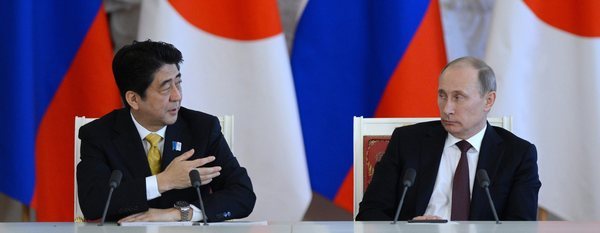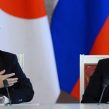
What Effect Will Asian Sanctions Have Upon Russia?
Publication: Eurasia Daily Monitor Volume: 11 Issue: 143
By:

In the wake of the newest sanctions on Russia by the European Union and the United States, Washington is seeking to persuade its Asian allies, Japan and South Korea, to follow suit (Yonhap July 31; Korea Times Online, July 29). While South Korea has hesitated to date, Japan went through with its promise, announcing new sanctions on July 28–29 (The Korea Times Online, August 1). These sanctions, which came into force on August 5, freeze the assets in Japan of individuals and organizations involved in destabilizing Ukraine, and they restrict imports from Crimea. Japan will also withhold support for fresh investments in Russia by the European Bank for Reconstruction and Development (EBRD) (Jiji Press, July 28).
This was not an easy decision for Japan. The Barack Obama administration reportedly felt that Japan was not showing sufficient support for the Western pressure on Moscow. Moreover, a visit by Vladimir Putin to Tokyo, scheduled for the autumn, would send the wrong message about the international consensus regarding how to deal with Russian aggression in Crimea and eastern Ukraine. Japan was clearly hesitant, but when it finally decided to impose new sanctions, the US welcomed the action (Kyodo World Service, July 29, August 1). Tokyo has already condemned Russia’s invasion of Ukraine, and it announced its support for the government in Kyiv. Furthermore, needing US support against China, Japan ultimately had few good options for how it should respond to Russia’s hostility (Kyodo World Service, Jiji Press, July 17). The new sanctions notwithstanding, Japan now finds itself in a quandary regarding future relations with Russia (Xinhua, August 1).
On the one hand, Tokyo still wants to leave an avenue open for Putin to come to Japan later this year and thus make progress—or at least the semblance of progress—on all important issues in the bilateral Russo-Japanese agenda (Xinhua, August 1). On the other hand, Japan knows it cannot withstand US pressure or the international public outrage caused by Russian actions—especially after the downing of Malaysian Flight MH17 with what the available evidence strongly suggests was a Russia-supplied BUK surface-to-air missile.
Additionally, there are powerful forces inside Japan that demand the return of all four of the Kurile Islands (known in Japan as the Northern Territories), which were seized by Moscow in 1945. They also argue that Beijing’s support for Moscow might lead Russia to assume it can carry out similarly aggressive and expansionist actions against Japan (maydan-news.blogspot.com, August 2). Therefore, Japanese experts have advised Tokyo to take a cautious approach to Russia in view of the Ukrainian crisis (Mainichi Shimbun Online, July 29).
For its part, Moscow still hopes to salvage Putin’s planned visit, as Russian Foreign Minister Sergei Lavrov stated last week (Jiji Press, July 28). And Moscow’s criticism of Japan for imposing sanctions has, to date, been relatively mild, showing the Russian government’s insight into Japan’s strategic predicament. The Russian foreign ministry called the imposition of sanctions an unfriendly and short-sighted step that damages relations, and it attacked Japan’s inability to take a stand distinct from that of Washington. It also warned that this step will damage bilateral relations. (Interfax, Ministry of Foreign Affairs of the Russian Federation, July 29). Yet, for his part, Lavrov publicly urged Japan to take “an independent stance and even went so far as to indicate Russia’s desire that Japan take part in the Russo-Chinese proposals for an Asian security architecture, something sure to roil the waters in Beijing (NHK, July 29).
Nevertheless, it seems unlikely that Putin will be allowed to visit Tokyo as long as there is no progress on a peaceful Russian withdrawal from Ukraine. Therefore, the dawning Russo-Japanese rapprochement, which both sides have sought for at least two years now, is likely to be sabotaged—largely by Russian imperialism that gave Tokyo no option but to stand with Washington.
Moreover, another issue could soon further aggravate Russo-Japanese relations. Thanks to the Ukraine crisis, France has come under mounting pressure to break off its sale of the Mistral helicopter carrier to Russia. Japan has joined this chorus, asking France not to sell that ship to Russia (Jiji Press, July 29). At the same time, the Japanese military has been looking to obtain a capability similar to that offered by the Mistral. Thus a possible solution would be to have France sell the Mistral to Japan instead of Russia. Indeed, Michael Auslin of the American Enterprise Institute recommended such an alternative in a Wall Street Journal opinion piece on July 31. However, were France to repudiate or break its contract with Russia and sell the Mistral to Japan, Tokyo would understandably come under serious attack by an aggrieved Moscow—a souring of relations that Beijing might indeed welcome.
For all the reasons outlined here, the question of whether the normalization of Russo-Japanese relations can move forward from here is now very much up in the air. But whatever pressures operate on Japan in world politics, Moscow has no one but itself to blame for bringing matters to this pass.




